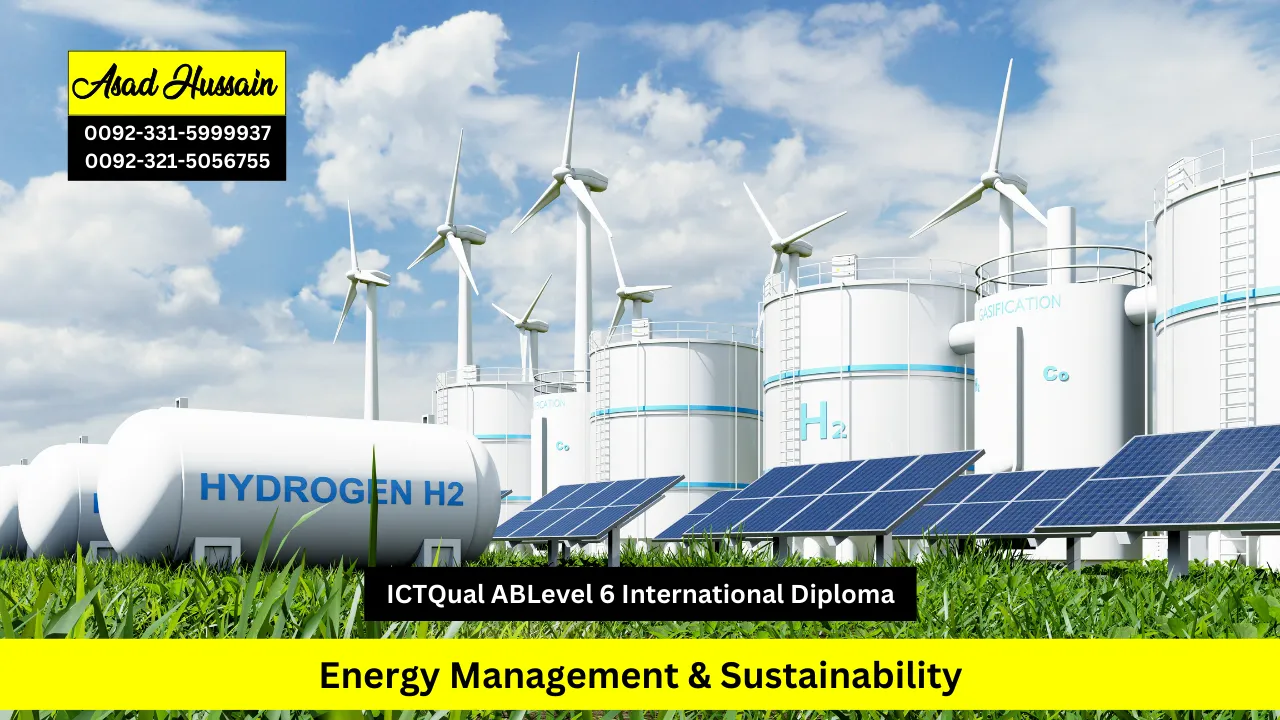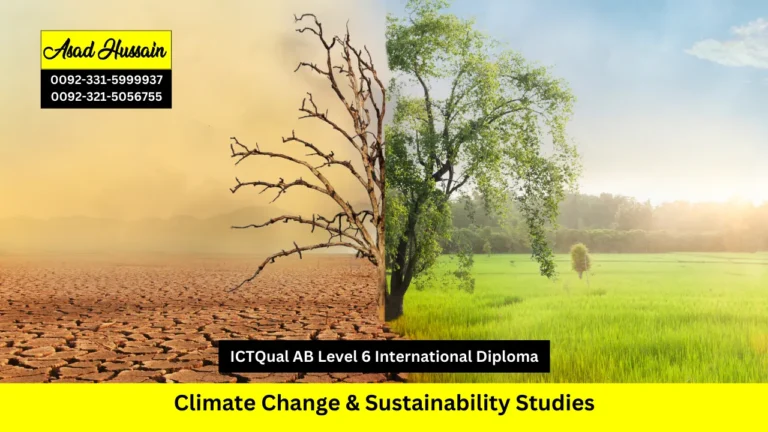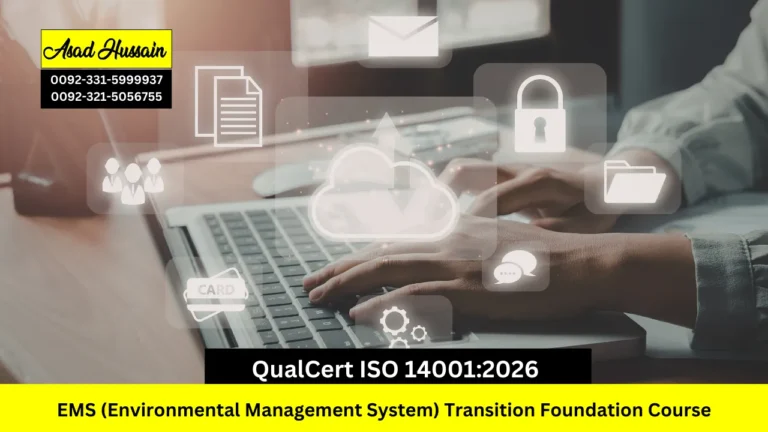The global shift toward sustainable energy solutions has placed energy management and sustainability at the heart of modern industries, policymaking, and environmental responsibility. The ICTQual ABLevel 6 International Diploma in Energy Management & Sustainability is a comprehensive program designed to equip learners with the technical expertise, analytical skills, and leadership abilities required to address the world’s growing energy challenges.
This diploma provides an in-depth understanding of energy systems, renewable technologies, efficiency strategies, and sustainable practices. Learners will explore advanced concepts in energy auditing, carbon footprint analysis, policy frameworks, and sustainable infrastructure development, ensuring they can contribute effectively to both corporate and governmental sustainability initiatives.
Through a blend of theoretical knowledge, case studies, and practical applications, participants will develop the ability to design and implement energy management systems that balance economic growth with environmental stewardship. Graduates of this program will be prepared to take on senior roles in energy management, sustainability consulting, environmental policy, and green project development, making them valuable assets in a rapidly evolving global economy.
The ICTQual AB Level 6 International Diploma in Energy Management & Sustainability is designed to equip learners with the knowledge, skills, and practical expertise needed to address the global challenges of sustainable energy use and environmental stewardship. This advanced qualification provides a comprehensive understanding of energy systems, renewable energy technologies, carbon management, and sustainability practices, making it ideal for professionals seeking to make a meaningful impact in the transition towards a greener economy.
Program Highlights
Study Units
Year 1 – Foundation in Energy Management & Sustainability
- Principles of Energy Systems
- Introduction to Sustainability Concepts
- Energy Auditing Fundamentals
- Environmental Science and Climate Principles
- Energy Conversion and Efficiency Basics
- Renewable Energy Overview
- Health, Safety, and Environmental Awareness
- Energy Measurement and Instrumentation
- Laboratory Techniques in Energy Systems
- Technical Report Writing
- Introduction to Energy Simulation Software
- Fundamentals of Carbon Management
Year 2 – Intermediate Energy Management & Sustainability
- Advanced Energy Auditing Techniques
- Sustainable Energy Technologies
- Energy Management Systems (EnMS)
- Environmental Impact Assessment and Compliance
- Energy Efficiency Optimisation Strategies
- Carbon Reduction and Climate Mitigation Practices
- Smart Grids and Energy Distribution
- Process Control and Automation in Energy Systems
- Project Planning and Technical Communication
- Quality Control and Assurance in Energy Projects
- Data Analysis and Monitoring for Sustainability
- Energy Policy, Regulations, and Standards
Year 3 – Advanced Energy Management & Sustainability
- Strategic Energy Management and Optimisation
- Energy Project Management and Leadership
- Emerging Technologies in Renewable and Sustainable Energy
- Energy Storage and Grid Integration
- Sustainability Reporting and Corporate Responsibility
- Risk Assessment and Hazard Analysis in Energy Projects
- Advanced Laboratory Techniques and Field Testing
- Carbon Accounting and Life Cycle Assessment
- Supply Chain and Logistics in Sustainable Energy
- Capstone Project in Energy Management & Sustainability
- Professional Development and Leadership in Energy
- Strategic Decision-Making for Energy Efficiency
Meeting the entry requirements ensures that learners are well-prepared to succeed in the ICTQual AB Level 6 International Diploma in Energy Management & Sustainability.
Age Requirements
- Learners must be at least 19 years of age at the time of enrollment in ICTQual ABLevel 6 International Diploma in Energy Management & Sustainability.
- Mature learners with relevant professional experience may also be considered.
Educational Requirements
- A recognized Level 5 qualification or equivalent in Engineering, Environmental Science, or a related discipline.
- Applicants with strong academic performance in science, technology, or sustainability-related fields will have an advantage.
Professional Experience
- At least 2 years of work experience in energy, utilities, environmental management, or related sectors is preferred.
- Candidates without experience may still apply, provided they hold strong academic qualifications and demonstrate motivation to succeed.
English Language Proficiency
- Non-native English speakers are required to demonstrate proficiency through IELTS 5.5 or an equivalent qualification.
- Applicants with prior education in English may be exempt from this requirement.
These entry requirements are designed to ensure that learners have the appropriate academic foundation, professional exposure, and language skills to maximize their learning experience.
The ICTQual AB Level 6 International Diploma in Energy Management & Sustainability is designed to equip learners with advanced knowledge, practical skills, and professional competencies required to excel in energy management, sustainability planning, and environmental leadership. This three-year, 360-credit programme ensures learners develop foundational, intermediate, and advanced capabilities in energy systems, carbon management, sustainability practices, and strategic decision-making in the energy sector.
Year 1 – Foundation in Energy Management & Sustainability
Principles of Energy Systems
- Explain fundamental concepts of energy generation, conversion, and distribution.
- Analyse energy flow in various systems for efficiency and sustainability.
- Apply theoretical knowledge to basic energy system models.
Introduction to Sustainability Concepts
- Define sustainability principles and frameworks in energy contexts.
- Evaluate environmental, social, and economic impacts of energy use.
- Apply sustainability concepts to practical energy scenarios.
Energy Auditing Fundamentals
- Conduct basic energy audits and identify areas for improvement.
- Analyse energy consumption data and prepare preliminary audit reports.
- Recommend efficiency measures based on audit findings.
Environmental Science and Climate Principles
- Understand the scientific principles of climate change and environmental systems.
- Assess environmental impacts of energy generation and consumption.
- Apply environmental knowledge to support sustainable decision-making.
Energy Conversion and Efficiency Basics
- Explain energy conversion processes and system efficiencies.
- Analyse performance metrics of energy systems.
- Apply techniques to improve energy utilization in practical scenarios.
Renewable Energy Overview
- Identify different renewable energy sources and technologies.
- Evaluate benefits, limitations, and applications of renewable solutions.
- Apply basic knowledge to small-scale renewable projects.
Health, Safety, and Environmental Awareness
- Identify workplace hazards and implement safety protocols.
- Comply with environmental regulations and sustainability practices.
- Apply safety standards in laboratory and field settings.
Energy Measurement and Instrumentation
- Operate measurement instruments for energy monitoring.
- Analyse collected data for system performance evaluation.
- Apply instrumentation knowledge to improve energy efficiency.
Laboratory Techniques in Energy Systems
- Conduct experiments to validate theoretical energy concepts.
- Interpret laboratory results and prepare technical reports.
- Apply practical skills to energy system testing and troubleshooting.
Technical Report Writing
- Prepare structured reports on energy audits, experiments, and projects.
- Communicate technical data effectively to diverse audiences.
- Apply professional documentation standards.
Introduction to Energy Simulation Software
- Operate basic energy modeling and simulation tools.
- Analyse simulation outputs for energy system optimization.
- Apply software skills in practical energy project scenarios.
Fundamentals of Carbon Management
- Understand carbon accounting principles and greenhouse gas measurement.
- Analyse emissions data and identify reduction opportunities.
- Apply foundational carbon management strategies in energy systems.
Year 2 – Intermediate Energy Management & Sustainability
Advanced Energy Auditing Techniques
- Conduct comprehensive energy audits for commercial and industrial systems.
- Analyse complex energy consumption patterns and identify savings potential.
- Apply advanced methodologies to develop actionable efficiency plans.
Sustainable Energy Technologies
- Evaluate emerging technologies in renewable and sustainable energy.
- Analyse technical performance and economic feasibility.
- Apply knowledge to design sustainable energy solutions.
Energy Management Systems (EnMS)
- Develop and implement EnMS frameworks in organizations.
- Monitor energy performance using ISO 50001 standards.
- Apply continuous improvement practices to achieve efficiency targets.
Environmental Impact Assessment and Compliance
- Conduct environmental impact assessments for energy projects.
- Ensure compliance with regulations and sustainability standards.
- Apply mitigation strategies to minimize environmental risks.
Energy Efficiency Optimisation Strategies
- Analyse system inefficiencies and propose improvements.
- Implement strategies for operational and process efficiency.
- Evaluate the impact of efficiency measures on costs and sustainability.
Carbon Reduction and Climate Mitigation Practices
- Develop carbon reduction strategies aligned with national and global targets.
- Apply mitigation practices in energy projects to minimize emissions.
- Monitor and report progress on carbon reduction initiatives.
Smart Grids and Energy Distribution
- Understand smart grid technologies and applications.
- Analyse load management and distribution network performance.
- Apply smart grid solutions to optimize energy delivery and reliability.
Process Control and Automation in Energy Systems
- Implement automation and control systems for energy efficiency.
- Monitor and adjust processes using modern instrumentation and software.
- Apply control techniques to optimize system operations.
Project Planning and Technical Communication
- Develop detailed energy project plans with schedules and budgets.
- Communicate technical information effectively to stakeholders.
- Apply project management principles to energy and sustainability projects.
Quality Control and Assurance in Energy Projects
- Monitor energy projects for quality, compliance, and performance standards.
- Apply corrective actions and continuous improvement strategies.
- Ensure adherence to organizational and regulatory quality requirements.
Data Analysis and Monitoring for Sustainability
- Collect and analyse energy and sustainability performance data.
- Use analytical tools to support decision-making and optimization.
- Apply monitoring techniques to enhance project outcomes.
Energy Policy, Regulations, and Standards
- Understand key energy policies, regulations, and international standards.
- Analyse the implications of legislation on energy projects.
- Apply regulatory knowledge to ensure compliance and sustainable practices.
Year 3 – Advanced Energy Management & Sustainability
Strategic Energy Management and Optimisation
- Develop strategies for energy optimization at organizational and project levels.
- Apply strategic planning tools to improve energy performance.
- Evaluate outcomes and implement efficiency improvements.
Energy Project Management and Leadership
- Lead energy management projects with multidisciplinary teams.
- Plan, execute, and monitor projects effectively.
- Apply leadership and decision-making skills in complex energy environments.
Emerging Technologies in Renewable and Sustainable Energy
- Analyse innovations in renewable energy and sustainability technologies.
- Evaluate feasibility and scalability of emerging solutions.
- Apply knowledge to implement innovative energy projects.
Energy Storage and Grid Integration
- Understand advanced energy storage technologies and applications.
- Analyse grid integration challenges and solutions.
- Apply storage strategies to enhance system reliability and sustainability.
Sustainability Reporting and Corporate Responsibility
- Prepare sustainability reports in accordance with global standards.
- Analyse corporate energy performance and social responsibility initiatives.
- Apply reporting tools to communicate progress to stakeholders.
Risk Assessment and Hazard Analysis in Energy Projects
- Identify potential operational and environmental risks.
- Conduct hazard analyses and develop mitigation strategies.
- Apply risk management practices to enhance safety and reliability.
Advanced Laboratory Techniques and Field Testing
- Conduct advanced experiments and field tests on energy systems.
- Interpret results to validate theoretical models and practical applications.
- Apply laboratory findings to optimize system performance.
Carbon Accounting and Life Cycle Assessment
- Measure and analyse carbon emissions across energy systems.
- Conduct life cycle assessments to evaluate environmental impact.
- Apply carbon accounting strategies for sustainable energy operations.
Supply Chain and Logistics in Sustainable Energy
- Manage procurement, logistics, and supply chains for energy projects.
- Apply sustainable practices in sourcing, transportation, and distribution.
- Optimise energy project operations through efficient supply chain management.
Capstone Project in Energy Management & Sustainability
- Integrate knowledge and skills acquired throughout the programme.
- Conduct an independent research or practical project in energy management.
- Present professional reports and project outcomes demonstrating expertise.
Professional Development and Leadership in Energy
- Develop leadership and management skills for energy and sustainability projects.
- Plan career growth and professional development strategies.
- Apply ethical, professional, and strategic standards in energy initiatives.
Strategic Decision-Making for Energy Efficiency
- Analyse complex data and operational scenarios to make informed decisions.
- Develop strategies to optimize energy efficiency and sustainability outcomes.
- Apply strategic thinking to drive organizational energy performance improvements.
Upon completion of the ICTQual AB Level 6 International Diploma in Energy Management & Sustainability, learners will have acquired advanced technical knowledge, practical skills, and professional competencies required to excel in energy management, sustainability, and leadership roles.
The ICTQual AB Level 6 International Diploma in Energy Management & Sustainability is tailored for individuals who aim to lead in the transition toward cleaner, more sustainable energy systems. This program is designed to accommodate a wide spectrum of learners, from professionals seeking career advancement to students preparing for impactful futures.
Educational Instructors and Trainers
- Gain updated knowledge in energy management and sustainability to strengthen academic teaching and training delivery.
- Develop industry-aligned insights to better mentor and prepare learners for careers in energy and environmental sectors.
Environmental Advocates and Activists
- Build technical knowledge and analytical skills to support advocacy for sustainable energy policies and practices.
- Learn to translate scientific and technical data into actionable strategies that promote environmental protection.
Students and Recent Graduates
- Acquire advanced, industry-relevant skills that complement academic qualifications and boost employability.
- Explore practical applications of energy management concepts to prepare for careers in renewable energy, environmental science, and engineering.
Career Changers
- Transition into the fast-growing energy and sustainability sector with a globally recognized qualification.
- Gain foundational and practical expertise to move from unrelated fields into renewable energy, carbon management, or sustainability consulting.
Policy Makers and Regulators
- Strengthen understanding of global energy frameworks, sustainability policies, and compliance standards.
- Learn to design and implement regulations that align energy development with environmental protection and climate goals.
This diploma is ideal for forward-thinking professionals, educators, students, and policymakers who are committed to shaping a sustainable energy future. By enrolling, learners not only expand their technical and strategic expertise but also position themselves as leaders in driving energy efficiency, renewable adoption, and sustainability practices across industries.







